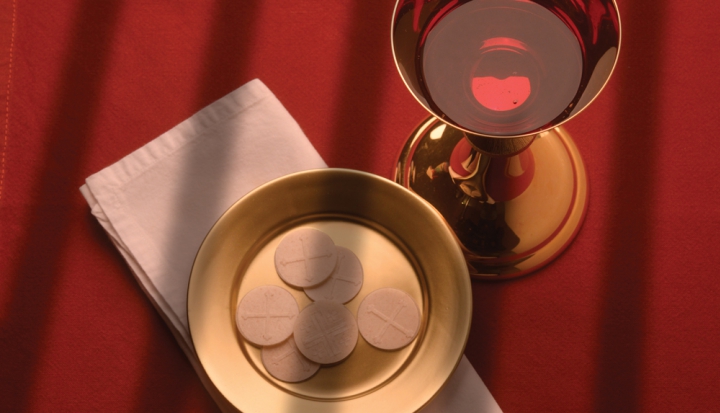“Peace be with you.” The hand extended at the sign of peace, the hand I grasp, may have also killed. Masses celebrated with men from Kentucky’s death row are among the most powerful experiences I have had, not only as a death penalty abolitionist but as a Catholic. Two or three times a year Sister Dorothy Schuette, a Benedictine and chair of Religious Communities Against the Death Penalty, obtains permission to bring a small group, including several of her fellow sisters, into the Kentucky State Penitentiary in Eddyville for Mass with men facing state execution.
The state penitentiary is on the western edge of Kentucky, several hours from the population centers that are home to most families of the prisoners on death row. Western Kentucky Parkway is a lovely, tree-lined route paving the way to the “Castle on the Cumberland,” the nickname of the prison. The imposing stone structure, built in the 19th century by prison labor, is like a grim resort on a hill overlooking Lake Barkley. The prison yard faces away from the lake, lending no view of it, only the shadow of its massive walls.
Passing security, the sisters and I wind through the old building, a jigsaw of various years of additions and renovations, officially smoke-free but still stinking from years of stale cigarettes. We await the Massgoers in the chapel, a bland, institutional space.
Death row prisoners are a small minority of about 30 in a crowded prison of more than 800. “Marked in and for blood” is the first thought that crosses my mind when I see the red jumpsuits. These men are segregated from the rest of the prisoners by color code—red for death row—as if they could forget that the executioner’s sword hangs over their lives daily.
Under normal circumstances, visits are one-on-one. Through special permission the sisters and I are granted a short window before and after Mass to visit with the men in a group setting. As they file in, I notice what a large group has chosen to attend Mass. The prisoners are happy to see the sisters, who often write and hold them in prayer. Some explain that they are not Catholic but that they have come to this Mass to thank the sisters. Seeing the prisoners together, it is immediately evident that their isolation and shared situation makes them a close-knit community.
Mass begins, and I am struck by the words of the Confiteor. I ask a room full of murderers to “pray for me to the Lord our God” for my sins. Despite the stereotype, most I meet do not claim they are innocent. Some acknowledge they should spend their lives behind bars, although they are fighting being sentenced to death. I am surrounded by people whose lives have come to be defined by acts truly terrible but that were only brief moments.
I could write more about cases of likely innocent people executed or victims’ families brave enough to refuse vengeance, but cold facts are trumped by personal experience. If I could intuit flaws in the abstract, I am viscerally confronted with painful injustice in the immediacy of worship.
When I receive the Eucharist beside a person guilty of taking another life, do I doubt Christ’s power to forgive his sins as mine are forgiven? When murder victims’ family members step forward to forgive, can I do less?
Following the U.S. bishops’ lead, it will take the willingness of priests and lay leaders to shine light on the hidden humanity of those rightfully removed from society but wrongfully denied time to repent or prove their innocence.
A couple of years ago, Georgia’s decision to execute Troy Davis created a public outcry, but problems continue. In late December Alabama death row inmate Ronald Smith’s appeal was denied because his lawyer, who was deemed suicidal and had addictions to alcohol and crystal meth, missed a filing deadline (in Alabama, the poor are not guaranteed legal representation in post-conviction proceedings). As long as the death penalty is on the books, innocent life is at risk.
In an age when society no longer requires capital punishment for its protection, may God forgive us for usurping the power to end a life.
This article appeared in the March 2013 issue of U.S. Catholic (Vol. 78, No. 3, pages 12-17).
Image: Tom A. Wright















Add comment